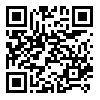Thu, Dec 25, 2025
| فارسی
Volume 16, Issue 1 (11-2021)
bjcp 2021, 16(1): 1-13 |
Back to browse issues page
1- Department of Psychology, Isfahan (Khorasgan) Branch, Islamic Azad University, Isfahan, Iran
2- Department of Psychology, Isfahan (Khorasgan) Branch, Islamic Azad University, Isfahan, Iran ,drmgolparvar@gmail.com
2- Department of Psychology, Isfahan (Khorasgan) Branch, Islamic Azad University, Isfahan, Iran ,
Abstract: (3839 Views)
The ability to emotion regulation is one of the variables that is very important for adolescents. The aim of this study was to evaluate the effectiveness of emotion regulation training on mother-adolescent interaction, social isolation and aggression in female adolescents. In a quasi-experimental design with pre-test, post-test with a control group and a two-month follow-up, 40 female adolescent through purposive sampling based on the entry criteria participated in this study. Selected sample then randomly assigned to the experimental group (20 people) and a control group (20 people). Participants in three stages of pre-test, post-test and follow-up responded to the Parent-Child Relationship Scale (1994), Social Isolation Questionnaire (1976) and Aggression Questionnaire (1992). The experimental group received emotion regulation training during 8 sessions of 60 minutes and the control group did not receive any training. Results revealed that emotion regulation training is effective in reducing aggression and increasing mother-adolescent relationships, and this effectiveness was stable until the follow-up stage. The effectiveness of emotion regulation training on reducing social isolation was not confirmed. It seems that through emotion regulation training, it is possible to strengthen the mother-adolescent relationship and reduce the aggression of adolescent girls.
Article number: 1
Keywords: Emotion regulation training, mother-adolescent interactions, social isolation, aggresion, female students
Type of Study: Research |
Subject:
Special
Received: 2022/07/2 | Revised: 2023/04/9 | Accepted: 2022/08/27 | ePublished ahead of print: 2022/08/27 | Published: 2023/03/16
Received: 2022/07/2 | Revised: 2023/04/9 | Accepted: 2022/08/27 | ePublished ahead of print: 2022/08/27 | Published: 2023/03/16
Send email to the article author
| Rights and permissions | |
 |
This work is licensed under a Creative Commons Attribution-NonCommercial 4.0 International License. |




